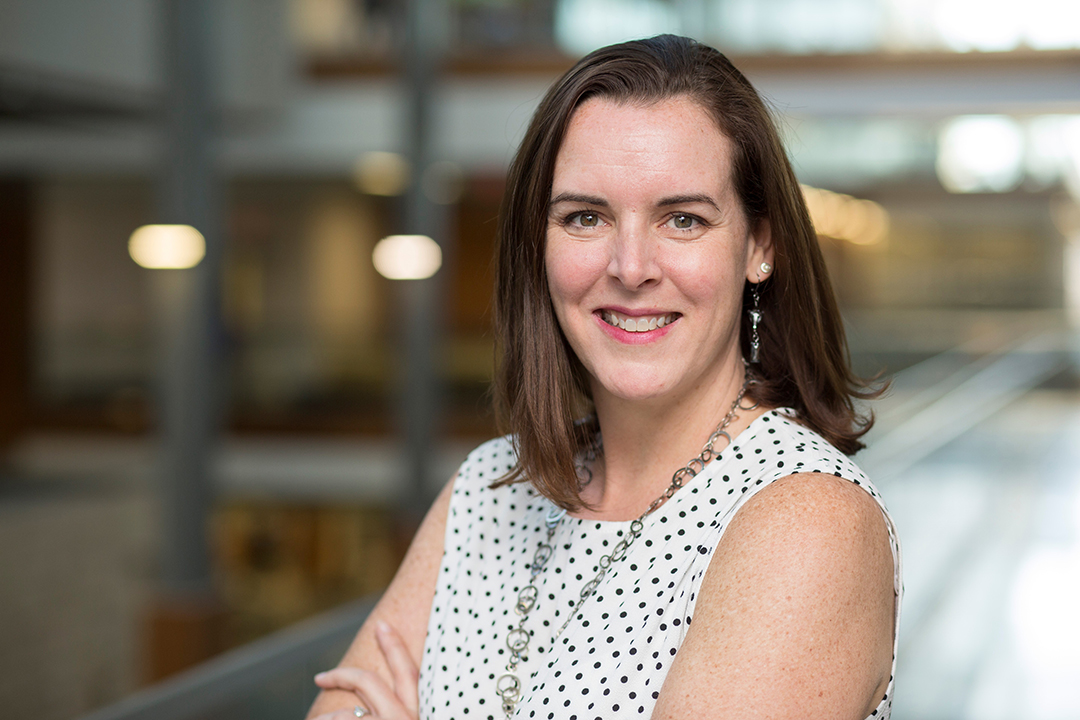
Building health care leaders at the College of Medicine
After months of work and collaboration, a USask College of Medicine (CoM) employee has received the Certified Health Executive (CHE) designation to help guide the college and better support its partnerships.
By Kristen McEwenSinead McGartland is the CoM’s director of planning, projects and communications. She plays a key leadership role in navigating the college’s strategic plans and partnerships across multiple sectors, including health care, government, academic and research.
McGartland intends to use the knowledge and learning she gained while achieving the CHE designation, which builds on skills, leadership and knowledge of health care systems.
“We need a strong administrative backbone that can support that collaboration, and respond in a way that meets the needs of our organization and partner organizations,” said McGartland, who is also part of the college’s leadership team.
McGartland earned the CHE designation through the University of Alberta’s Fellowship in Health System Improvement program. The program provided opportunities to explore leadership and connect with leaders in politics, government and health care. While the program is usually nine-months, it was extended to twelve-months due to COVID-19.
“All of the skillsets that I developed during the fellowship, helped me think about these complex challenges we are trying to address, or contribute to finding a solution to, through our partnerships,” McGartland said.
The CHE designation, which is recognized by the Canadian College of Health Leaders (CCHL), supports leaders working in Canadian health systems to define and understand their leadership, and the role they play in leading change in their organizations. The CHE designation is aligned with the LEADS (LEADS in a Caring Environment) framework for health care leaders. The framework was developed with the belief that individuals at all levels of an organization can influence the direction of the organization and culture.
McGartland credited strong mentors in the college’s leadership team for supporting and encouraging her to complete the course, including Chief Operating Officer Greg Power and Vice-Dean of Faculty Engagement Dr. Marilyn Baetz (MD).
Professional development supports through benefits offered at the college also helped her to access the course and complete designation work, she added.
Most of McGartland’s career has focused on the health care system and how it can be improved. Her journey in health care leadership began as part of the Royal Commission on the Future of Health Care in Canada, also known as the Romanow Report.
“I really started from there – listening to the passion that people have for better health care,” she said. “I knew that could be done in Saskatchewan, through partnerships and collaboration. I could play a role to make sure those connections happen.”
Throughout her roles, from the Health Quality Council to the Saskatchewan Academic Health Sciences Network, McGartland knows that health care is an important subject to everyone.
“Access to quality health care is a critical message that everyone shares in their personal journey,” she said. “The complexity of the health care arena requires strong coordination, collaboration, and a passion for facilitation.”
In her position at the college, McGartland knows change only happens when you have passionate leaders and people who understand what’s happening across the academic, research and clinical service environments.
“That’s what keeps me excited and engaged in this work,” she added. “Our roles in administration in the university adds value to other frameworks and ways of learning and thinking.
“When we have a strong administration contributing to the vision of this college, we support the college to deliver on its mandate of improving health and well-being of the people of Saskatchewan and the world.”
